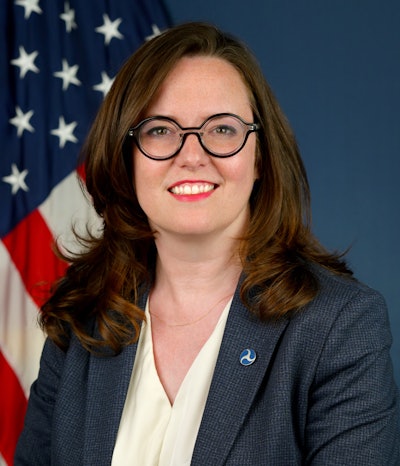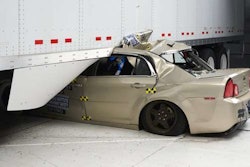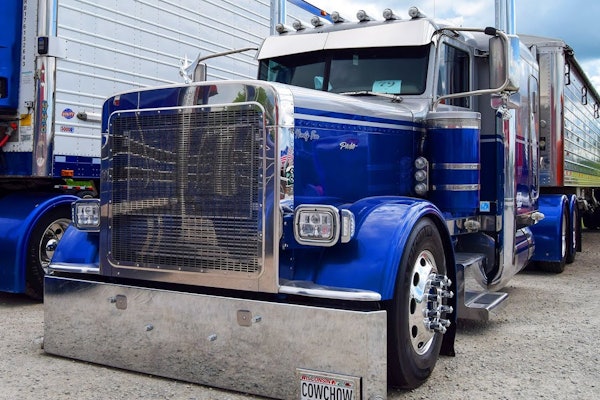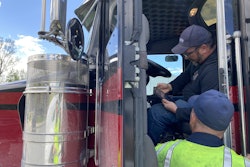Trucking news and briefs for Wednesday, July 10, 2024:
OOIDA raises concerns over underride report
In a letter to Congressional transportation leaders Wednesday, the Owner-Operator Independent Drivers Association voiced concerns over recommendations and advice regarding underride guards on trucks submitted to the National Highway Traffic Safety Administration.
As reported Tuesday, NHTSA’s Advisory Committee on Underride Protection was split in its report, with a slight majority being critical of the agency’s efforts to date on safety related to underride protection, and a minority of the 16-member committee advocating for additional studies into the costs and benefits of side and front underride guards and stronger rear underride guards.
OOIDA’s letter to members of the U.S. House Committee on Transportation & Infrastructure and the Senate Committee on Commerce, Science & Transportation is critical of the committee’s work during its meetings discussing various underride topics since the committee was established.
“Over the course of these meetings, ACUP failed to work in a collaborative and consensus fashion,” OOIDA President Todd Spencer said in the letter. “Safety advocacy representatives manipulated their numerical advantage in Committee membership and approved a motion to define ‘consensus’ as a simple majority that minimized opposing viewpoints of other ACUP participants.”

[Related: Heated debate over recommendations for improving underride guard regulation]
Spencer added that “OOIDA warned that granting such an advantage to biased advocates would jeopardize the panel’s ability to achieve its mission of developing a concise, data-driven report that garnered consensus support among participants and stakeholders. ACUP’s brazen decision to redefine consensus as a simple majority validated our concerns and ultimately doomed this advisory process.”
The majority report in the committee’s larger report highlighted the advocates’ “shameless intention to ignore the Congressional directive to achieve consensus agreement,” Spencer said.
[Related: Claims trailer rear-impact guard standards are 'inadequate and dangerous' shot down by NHTSA]
Regarding the recommendations offered by the committee, Spencer called them a "wish list of cost-prohibitive, unfeasible recommendations that were approved by a slim majority of ACUP participants. These motions merited substantive opposition and should not be used as a foundation for policy development.”
OOIDA also noted its concerns about mandating underride equipment, particularly side underride guards. “OOIDA has discussed operational challenges regarding rail-crossings, loading docks, and low ground clearances with Congress, as well as equipment damage resulting from curbs, roundabouts, speed bumps, and other highway features,” Spencer said. “These are all discussed at length within ACUP’s minority report.”
Ultimately, OOIDA said NHTSA should hold off on “potential new underride standards until further research, analysis, and testing is completed as directed in the Bipartisan Infrastructure Law. The only recommendations that garnered true consensus support among panel members generally involved enhancing research and reporting. As such, these are the only elements of the final report Congress and USDOT should take seriously.”
[Related: Side underride guard mandate: Rail disaster waiting to happen?]
Members of Southeastern cargo theft ring sentenced to prison
Four members of a Southeastern U.S. cargo theft ring were recently sentenced to prison for multiple cargo thefts throughout the Southeast totaling more than $1.7 million.
According to U.S. Attorney Ryan K. Buchanan in the Northern District of Georgia, the defendants -- Yunior Hernandez, Roberto Quesada Lopez, Carlos Alberto Valdes, and Yubani Millares Vera -- operated a cargo theft ring throughout 2019 across the Southeast, with the stolen goods taken to Florida and sold.
“Thefts of interstate shipments disrupt the production and delivery of needed goods and result in detrimental financial impact on businesses, consumers, and the U.S. economy generally,” Buchanan said. “The sentencing of these defendants is an example of our office’s commitment to prosecute these criminals as well as a warning to others that these offenses are an investigative priority for our federal, state, and local law enforcement partners.”
[Related: Congress eyes creation of anti-fraud/cargo theft task force]
According to a press release from Buchanan, the defendants were responsible for these thefts:
- $500,000 worth of computers in Macon, Georgia, on May 18, 2019
- $640,000 worth of computers meant for the Centers for Disease Control in Emerson, Georgia, on June 11, 2019
- $110,000 worth of copper in Denmark, Tennessee, on July 21, 2019
- $110,000 worth of copper in Glade Springs, Virginia, on Sept. 2, 2019
- $110,000 worth of copper in Fairview, Tennessee, on Oct. 6, 2019
- $340,000 worth of apparel in Kingsland, Georgia, on Nov. 16, 2019
Hernandez, 50, of Homestead, Florida, was sentenced to two years, nine months, of incarceration to be followed by three years of supervised release. He was also ordered to pay $880,857.43 in restitution. Hernandez was convicted of conspiracy on Dec. 20, 2022, after he pleaded guilty.
Valdes, 55, of Hialeah, Florida, was sentenced to three years, 10 months followed by three years of supervised release. He was ordered to pay $1,543,890.60 in restitution. Valdes was convicted of conspiracy on Jan. 19, 2023, after he pleaded guilty.
Lopez, 44, of Hialeah, Florida, was sentenced to two years, six months and ordered to pay $1,229,888.32 in restitution. He was convicted of conspiracy on July 18, 2023, after pleading guilty.
Millares Vera, 49, of Hialeah, Florida, was sentenced to five years in prison and three years' supervised release. He was ordered to pay at least $1,760,479.12 in restitution. Millares Vera was convicted of conspiracy on March 14, 2024, after he pleaded guilty.
This case was investigated by the Federal Bureau of Investigation. Assistance was provided by the Miami-Dade County Police Department, Economic Crime Bureau, and the Federal Bureau of Investigation Miami Field Office.
“The FBI takes cargo theft very seriously, due to the significant impact it has on the United States economy, and the potential for stolen goods to be used to fund other criminal organizations,” said Keri Farley, Special Agent in Charge of FBI Atlanta. “This theft conspiracy did not stop at our state border, and neither did our investigation. Thanks to our partnership with Miami agencies, we tracked these thieves across the entire Southeast, and now they will be held accountable for their crimes.”
[Related: Chicago-area freight thief steals $9.5M in goods: Courts]
FMCSA names new chief counsel
The Federal Motor Carrier Safety Administration on Tuesday announced Melody Drummond Hansen as the agency’s new Chief Counsel.
 Melody Drummond Hansen
Melody Drummond Hansen
Drummond Hansen brings a decade of experience advising clients across the automotive and transportation industry and 20 years of experience in emerging technologies.
“Melody is a great addition to the FMCSA leadership team,” said FMCSA Acting Administrator Vinn White. “This is an exciting time for the agency, and I have no doubt that Melody’s dedication and proven track record in transportation and technology will help advance FMCSA’s mission and improve safety for everyone traveling the nation’s roadways.”
Before joining FMCSA, Drummond Hansen was a partner at BakerHostetler LLP, where she was a co-chair of the Automotive/Mobility industry team and a member of the Intellectual Property Group. She advised clients on a range of transportation and technology matters, including automated and connected vehicles, avionics, fleet management, electric and hydrogen-powered vehicles, telecommunications standards, data privacy and security, digital infrastructure, and artificial intelligence.
Drummond Hansen is originally from South Carolina. She received a Bachelor of Arts degree from Georgetown University, a Master of Science from the University of Oxford, and a Juris Doctor from the University of Chicago Law School.
[Related: DOT's acting AI chief named FMCSA boss]











